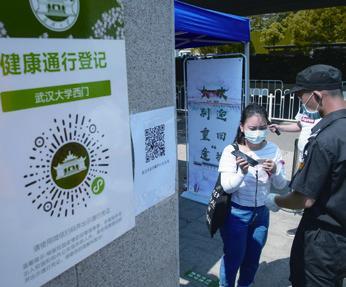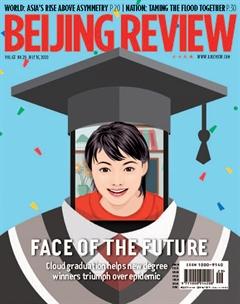A VIRTUAL GOODBYE
By Yuan Yuan



Li Mengrong is among the 10 lucky graduates at the Nanjing University of Posts and Telecommunications who had their tassels turned by the university president—with the help of a robot.
Li joined the on-campus commencement ceremony remotely through the Internet, represented by a humanoid robot with Lis “face,” which walked up to the universitys President Ye Meilan in the graduation gown to receive the diploma. The president and Li greeted each other virtually and Ye then turned the tassel on the robots graduation cap and handed the diploma to it. The video of the ceremony went viral.
The special ceremony was held not only as an opportunity for the school to showcase the robots developed by its students, but also because many graduates could not attend in person due to the novel coronavirus outbreak.
For the class of 2020, the graduation this year is special and unforgettable.
A slow semester
When a student using the pseudonym Shi Yifei was preparing for the graduate school entrance exam at Beijing Normal University last winter, she looked forward to celebrating the graduation with her classmates. She had even chosen the kind of dress and hairstyle she would wear for the group photos with classmates.
After taking part in the exam in December 2019, she attended some job fairs before heading home in Shandong Province in east China for winter vacation.“Some companies scheduled job interviews after Spring Festival,” she told Beijing Review.“The result of the postgraduate exam was supposed to come out in February.”
But the epidemic slowed everything down. The job interviews were held online and it took companies longer to make an offer. The graduate school entrance exam results came out late and the second round of the exam, which is normally held in March, was put off to May.
These changes created many uncertainties for students. While sending resumes online and anxiously waiting for the exam result, she started to work on the graduation thesis at home. “Even though I couldnt access the library on campus, I got enough reference materials from the digital library, which was also fine,” she said.
Yao Xianyu, a doctoral student at Guangxi University in south China, also found his life derailed by the epidemic. He planned to get back to the lab on campus on February 1 to conduct experiments and collect data for his thesis, but on January 26, was informed that students couldnt return to school in February.
Yao didnt take it seriously in the beginning. “It was fine if we got back to school in March,” he told Shanghai-based news portal ThePaper.cn. He waited till the middle of March but still didnt get any news from the school and started to feel nervous about his thesis. “There are many students relying on the facilities in the school for their theses,”Yao said. “There is no way for us to do experiments at home.”

Finally, the university allowed some students to get back on April 24 and their thesis defense was postponed accordingly.
Students in many universities in Beijing were permitted to return to school on later dates. Tsinghua University didnt allow students to come back until June 6. A doctoral student surnamed Zhang told China Youth Daily that he had to rely on his tutor to collect data from the giant computer in the school to finish his thesis. He passed the thesis defense held online in May, before he returned to school.
June 6 was the earliest date the Beijing Municipal Government had set for graduating students to return to campus. At that time, the epidemic in China had been largely contained. Final-year students were optimistic that they might be able to take off their masks when celebrating graduation.
But the emergence of new cases of coronavirus in Beijing dashed the hope. Starting from June 11, Beijing tightened epidemic control. Students had to cancel plans for in-person graduation festivities. “Its like we have prepared a banquet, but the guests dont show up in the end,” said Ji Jinbiao, President of Beijing International Studies University.
Students who had already returned to campus in early June had to leave in batches. Those who had not yet returned had their belongings shipped back home by the schools. Many students found the graduation season dismal. “Many of my friends said it might be the year with the least graduation atmosphere on the campus,” Zhang said.
Cloud ceremony
However, with digital technology, many students have managed to celebrate their graduation despite the epidemic.
About 8.74 million students graduate from colleges and universities in China this year. A survey conducted by China Youth Daily showed that 88.6 percent of new Chinese college graduates celebrated their graduation in digital form, which is called“cloud graduation.”
“No one had ever imagined that we couldnt get back to school at all in the last semester,” said Hong Xinyi, a graduate from Beijing-based Communication University of China (CUC).
Students from the School of Animation and Digital Arts in CUC simulated their campus life in the computer game Minecraft. Everybody can log in to take a tour of the campus in the game. They can walk and fly on the campus, get into their dorm building, and visit restaurants, canteens and even the popular milk tea bar. They can also attend a simulated graduation ceremony.
Students nationwide love the game. “It looks so cool,” commented a netizen who claimed to be a graduate this year. “This special year has given birth to some very innovative ideas.”
Many universities held cloud graduation ceremonies, with a small number of graduates attending in person and others joining online. To ensure safe distance, the ceremonies couldnt be held indoors.
In Peking University, out of 12,200 finalyear students, less than 2,500 participated in on-campus celebrations held at nine different venues in the university.
“Because of the change in the epidemic situation, many students who planned to return to the campus were not able to come back,” Hao Ping, President of Peking University, said. “This graduation ceremony will be remembered by all of us for the rest of our lives.”
Hao said more than 3,500 teachers offered more than 6,400 online courses for students during the past few months. The university also sent 454 medical workers to Hubei Province and set up several scientific research teams to provide support in the fight against the virus.
Liu June, a doctoral student from the university majoring in medicine, said via a video link at the ceremony that she was told on January 26 to return to the lab in the university to study the virus, which can lay a foundation for the research and development of COVID-19 vaccines.
Li Zhengyu, a postgraduate student majoring in demographic studies at the university, said he was touched by the ceremony this year. “The pandemic has made me feel that the good days never come easy. Young people like me need to go where the country needs us the most,” Li said.
At the China University of PetroleumBeijing at Karamay, Xinjiang Uygur Autonomous Region in northwest China, 118 of 435 graduates chose to work at the grassroots level in Xinjiang.
President Xi Jinping expressed support for their choice in a letter on July 8, encouraging new graduates to “aim high, be downto-earth, brave difficulties and obstacles, shoulder the mission of the times, integrate their pursuit of ideals into the cause of the country, and make more contributions.”
Many universities said even though they couldnt manage to hold graduation ceremonies, this years graduates can choose any year to return for a degree-awarding ceremony. The schools prepared various souvenirs for the graduates. China University of Geosciences gift for the graduates was a silver ring mounted with different kinds of stones—crystal for bachelors degree, sapphire for masters degree and diamond for doctors degree.
On June 27, Xinhua News Agency held an online concert in which pop stars and graduates from 16 universities participated. On the same day, another online gala held jointly by the Ministry of Education and Peoples Daily was attended by students from over 70 universities.
Duo Lei, a graduate from Tsinghua University who presented a hip-hop show in the gala, said even though the epidemic forced this years graduates to miss a precious occasion on the campus, this unique memory is a treasure for them all.


After witnessing how the Chinese have jointly fought against the virus and the government has given priority to peoples lives, Buttarello Lorenzo, an Italian graduate from Chongqing University in southwest China, said in his graduation ceremony speech on June 28 that he felt lucky to be in China during the epidemic.
“If possible, I believe most of us want to restart the year 2020. But we cannot go back in time. Even though the epidemic has brought us hardship, what weve learnt from it might change our life,” he said.

